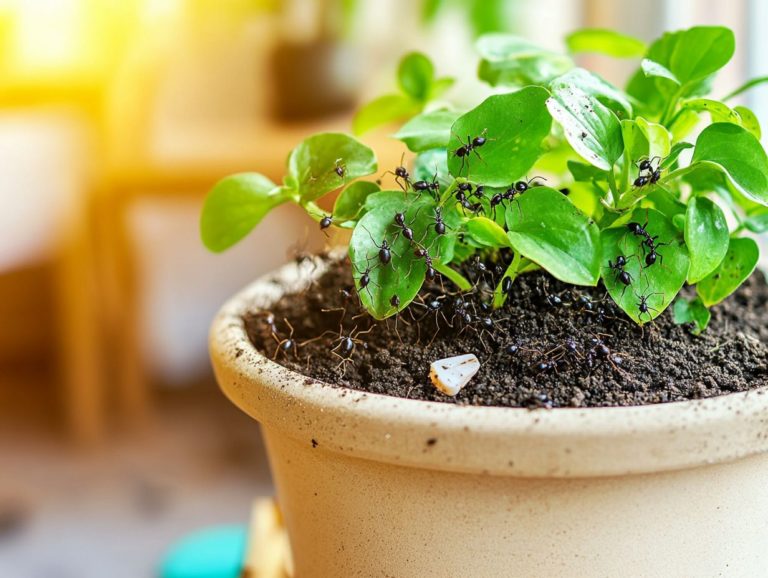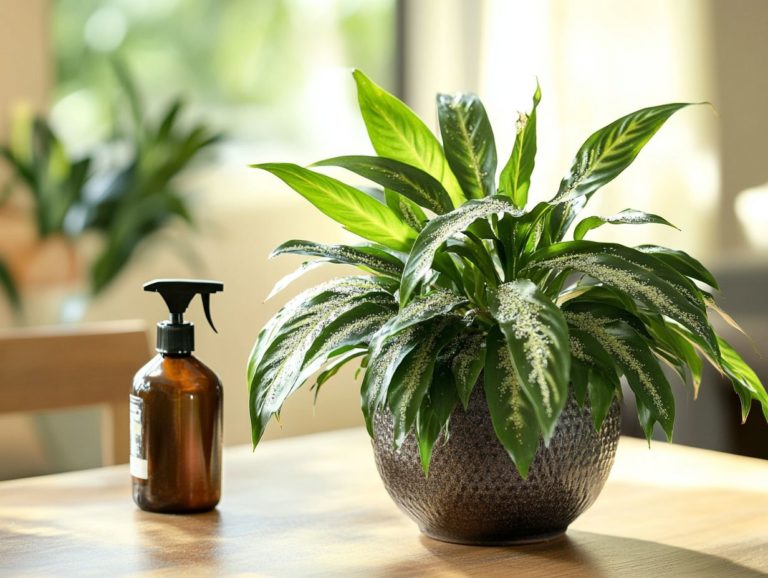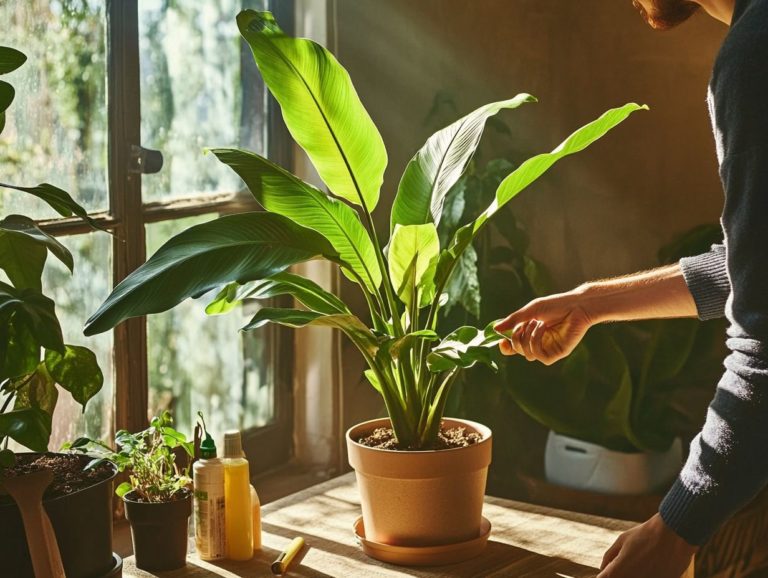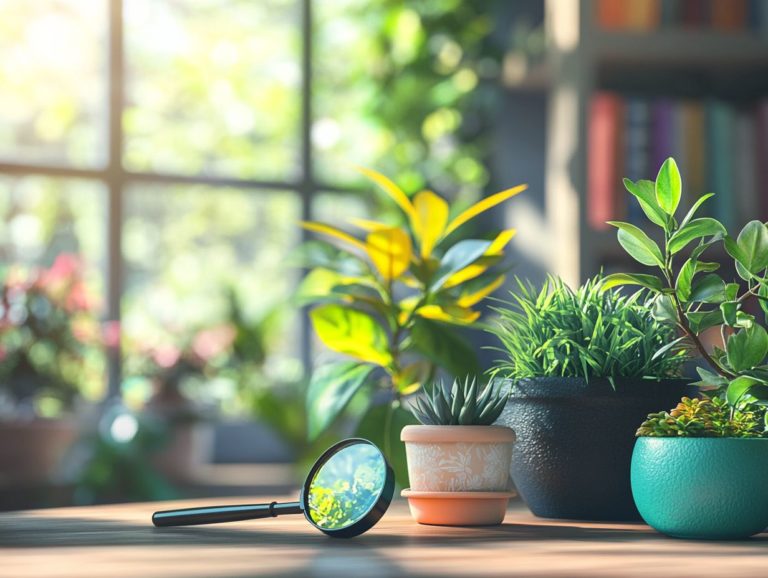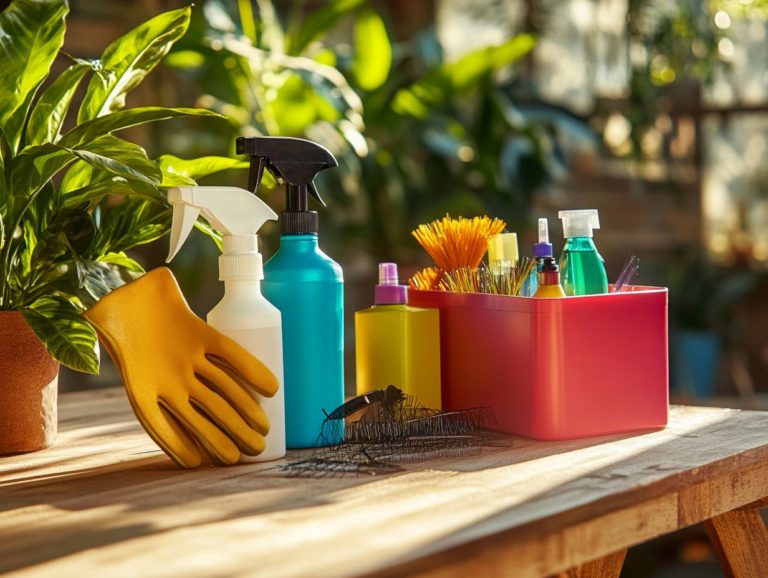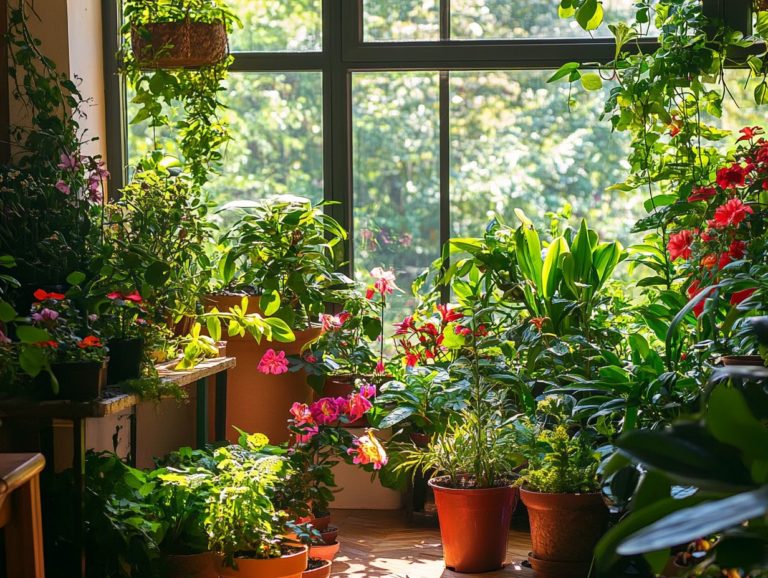How to Eliminate Indoor Plant Pests Naturally
Indoor plants infuse your space with life and beauty, but they can occasionally attract unwelcome guests: pests.
From aphids to spider mites, these tiny intruders can cause chaos among your beloved greenery. Thankfully, there are natural solutions to tackle these issues without relying on harsh chemicals.
Get ready to explore effective strategies that will transform your indoor gardening experience! You ll discover valuable tips, from utilizing essential oils to introducing beneficial insects, all designed to keep your plants thriving and free from pests.
Contents
- Key Takeaways:
- Common Types of Pests and Their Damage
- Natural Ways to Eliminate Indoor Plant Pests
- Preventing Pests in Indoor Plants
- Dealing with Severe Infestations
- Frequently Asked Questions
- What are some natural ways to eliminate indoor plant pests?
- How does insecticidal soap work to eliminate plant pests?
- What is neem oil and how can it help with indoor plant pests?
- How does diatomaceous earth help eliminate indoor plant pests?
- Can using natural methods to eliminate plant pests harm my plants?
- Are there any natural predators that can help control indoor plant pests?
Key Takeaways:
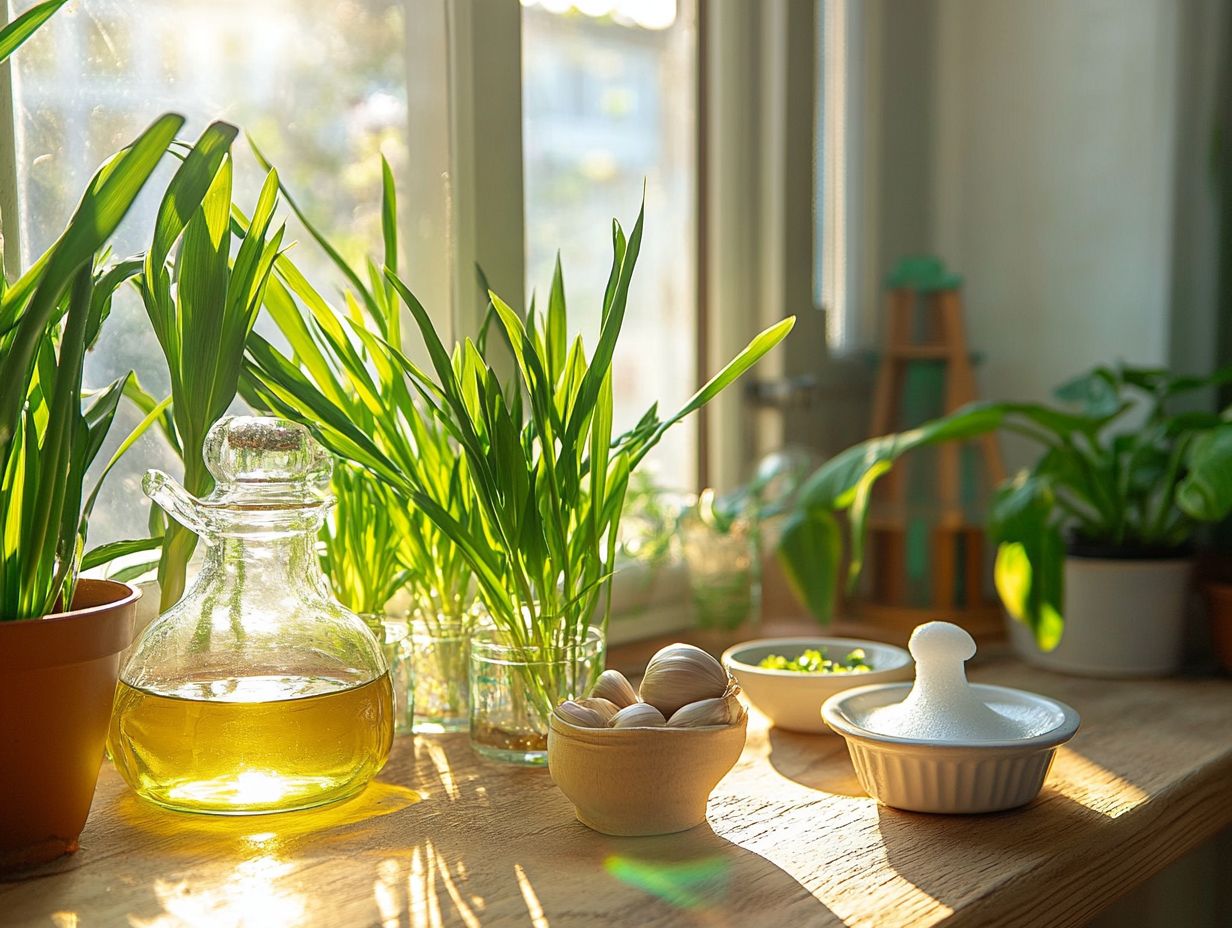
- Eliminate indoor plant pests naturally by using essential oils and natural sprays, which are effective and safe alternatives to chemical pesticides.
- Introduce beneficial insects, such as ladybugs and praying mantises, to your indoor garden to naturally control pest populations without harming your plants.
- Prevent pests in your indoor plants by providing proper care and maintenance, and by modifying their habitat to make it less favorable for pests to thrive.
Common Types of Pests and Their Damage
Identifying the common types of pests that can invade your indoor plants is essential for maintaining soil health. Understand how to manage houseplant soil and help your indoor plants grow well.
Consider fungus gnats, which thrive in damp potting soil. Spider mites weave webs on leaves understanding their behaviors and the damage they inflict is key to implementing effective pest control strategies.
Whiteflies and aphids also pose considerable challenges; they feast on the sap of your plants, hindering their growth and vitality.
By equipping yourself with knowledge about these threats, you’ll be empowered to take proactive measures against infestations and protect your green sanctuary. This includes using effective pest control methods to maintain plant health.
Natural Ways to Eliminate Indoor Plant Pests
Embracing natural methods to combat indoor plant pests offers you an effective and eco-friendly approach to nurturing your houseplants’ vitality without the need for harsh chemicals. Consider various remedies at your disposal, such as homemade bug sprays crafted from essential oils or a hydrogen peroxide solution, both of which can effectively deter common nuisances like aphids and spider mites.
Diatomaceous earth is a great organic pesticide, a powder made from tiny fossilized sea creatures that helps kill pests. For those who take indoor gardening seriously, neem oil stands out as another powerful option in your pest control arsenal. Additionally, if you’re dealing with aphids, you can learn how to remove aphids from indoor plants effectively.
Using Essential Oils and Natural Sprays
Essential oils, derived from plants, are becoming increasingly popular among indoor gardening aficionados as effective natural insecticides for crafting homemade bug sprays. These essential oils not only deter pests but also help maintain soil health by preventing the buildup of harmful microorganisms.
Consider options like peppermint, tea tree, and cinnamon oil; you can easily mix them with water and apply them to your plants to naturally combat infestations like spider mites and aphids. For more detailed information on handling these issues, check out how to identify common indoor plant pests. These can also function as natural remedies for further pest prevention.
By leveraging the capabilities of nature, you’ll find that essential oils can be your potent allies against those unwanted intruders while promoting a balanced ecosystem in your indoor garden. Each type of oil boasts unique properties that repel specific pests and enhance your plants’ overall vitality. For instance, lavender oil is particularly renowned for its effectiveness against moths and mosquitoes, while eucalyptus oil targets mealybugs and whiteflies. To learn more about keeping your plants safe, check out this guide to keeping your indoor plants pest-free.
To whip up a simple yet effective bug spray, combine 10-15 drops of your chosen essential oil with a cup of water and a few drops of mild dish soap. Shake it well before spraying on the affected areas, making sure to cover thoroughly for optimal results.
Introducing Beneficial Insects
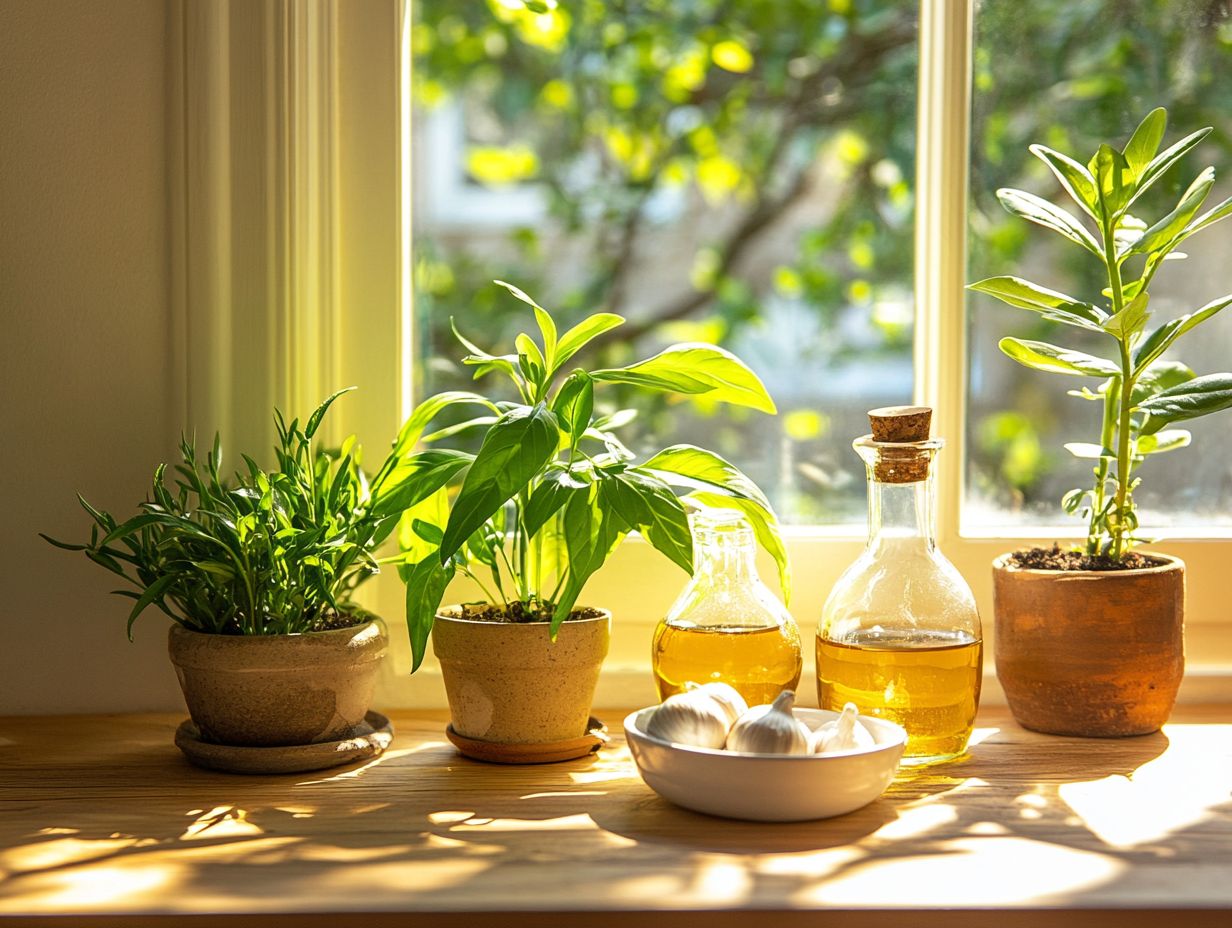
Discover how beneficial insects can transform your indoor garden into a thriving sanctuary! Introducing beneficial insects into your indoor gardening can be a game-changer for natural pest control. By effectively reducing populations of common houseplant pests without resorting to harmful chemicals, you set the stage for a healthier plant ecosystem. Predatory insects like ladybugs and lacewings will happily feast on pesky aphids and spider mites. This method removes pesky bugs and boosts soil health, making your plants thrive.
By welcoming these allies into your green sanctuary, you’re not just bolstering natural pest control; you’re also enriching the environment for your plants. Consider integrating other beneficials, such as predatory mites and parasitoid wasps, which target specific pest species. Additionally, using traps for indoor plant pests can be an effective strategy. Choosing the right one is crucial for a successful introduction.
Make your indoor garden inviting. Maintain appropriate humidity levels and provide food sources like pollen or nectar to keep these beneficial insects thriving. It’s also important to watch for signs your indoor plant has pests and avoid broad-spectrum pesticides that could jeopardize their well-being. With careful planning and monitoring, you can transform your indoor garden into a flourishing, pest-free haven.
Preventing Pests in Indoor Plants
Preventing pests in your indoor plants is essential for thriving indoor gardening, demanding your focus on meticulous plant care and maintenance practices. By ensuring optimal watering and moisture control, you can cultivate an environment that significantly reduces the risk of infestations from common houseplant nuisances like fungus gnats.
You can also employ habitat modification techniques such as fine-tuning light conditions and improving airflow to further deter pests. For additional guidance, consider preventing pest infestations in indoor plants. These adjustments will foster the health of your indoor plants and contribute to better soil health.
Proper Plant Care and Maintenance
Proper plant care and maintenance are essential for keeping your indoor plants healthy and pest-free. Neglecting them can lead to moisture imbalances, creating a perfect breeding ground for pests. By regularly checking soil health and ensuring you water your indoor plants correctly, you can prevent common issues like overwatering that attract unwelcome guests like fungus gnats. Recognizing early signs of infestation and sticking to a consistent care routine will help you cultivate a thriving indoor garden.
First and foremost, mastering the optimal watering technique is crucial. Water only when the top inch of soil feels dry to the touch. This approach allows you to avoid waterlogging, which can diminish oxygen levels in the soil and compromise root health.
Keeping an eye on moisture content will also help you spot any unusual changes that might indicate pest problems, such as spider mites or aphids. A quick examination of leaves for yellowing or wilting can signal insufficient water or nutrient deficiencies.
By implementing these practices, you ll not only boost your plant s vitality but also create a healthier, more vibrant indoor environment.
Habitat Modification and Prevention Techniques
Adjusting the environment of your indoor plants helps prevent pests. Thoughtful adjustments to their surroundings and the use of organic pesticides when necessary can be very effective.
By fine-tuning your light management to ensure that your plants bask in adequate light without being overwhelmed by excessive direct rays, you can alleviate stress that often draws in pests. Maintaining an optimal temperature range is equally important; cooler nights can disrupt the reproductive cycles of pests that thrive in warmer conditions. Additionally, utilizing natural remedies for houseplant pests can further enhance your plant care routine.
Enhancing airflow around your plants not only reduces the humidity levels that many pests favor but also bolsters plant health by promoting efficient transpiration. These strategic modifications will deter unwanted invaders and cultivate vibrant, flourishing indoor foliage that you can take pride in.
Dealing with Severe Infestations
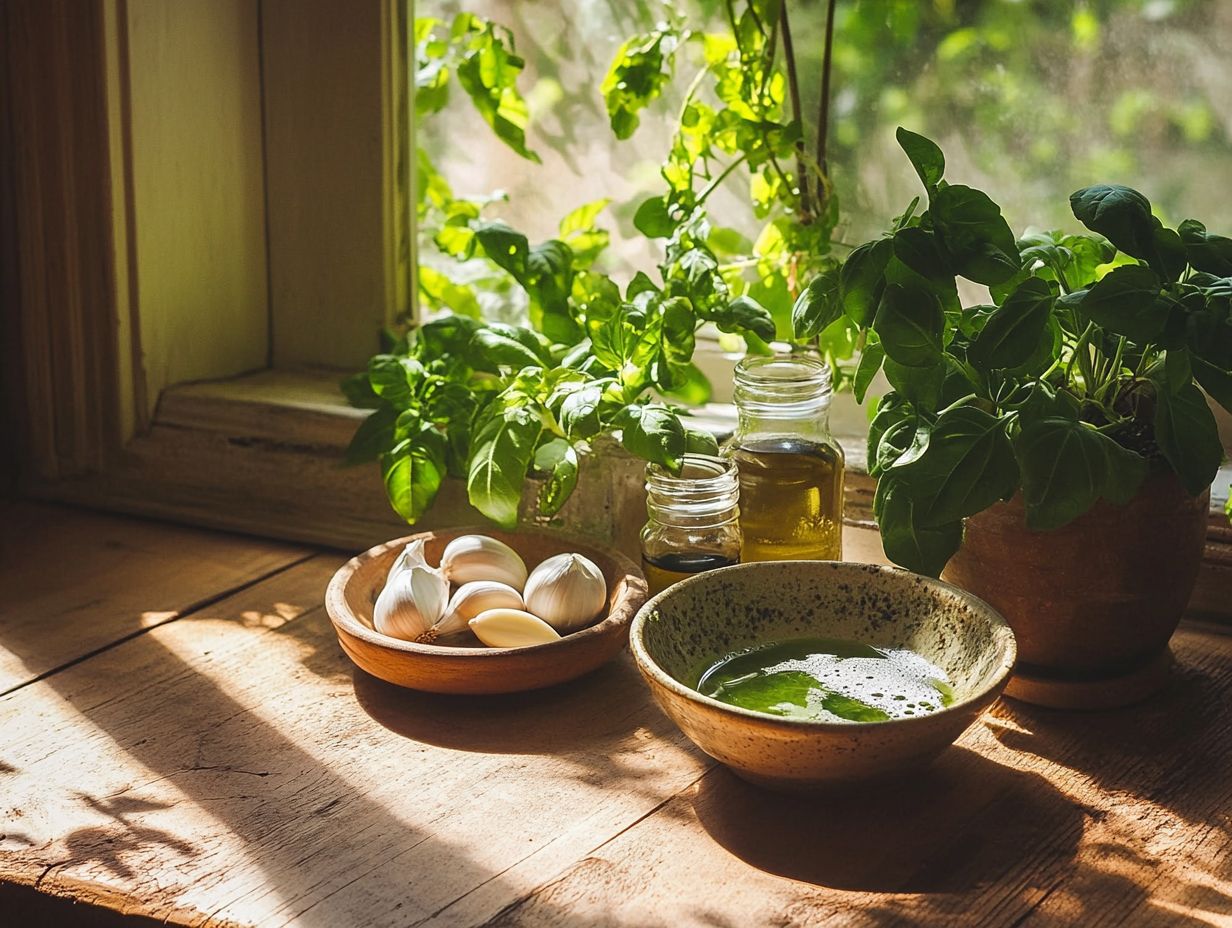
Addressing severe infestations in your indoor plants demands swift action and a comprehensive strategy to revive their health. If homemade bug sprays and organic pesticides aren t working, it s time to evaluate the situation.
This assessment helps you decide if it’s time to call in the professionals. Understanding the severity of the infestation will guide your next steps.
When to Seek Professional Help
Recognizing when to seek professional help is essential for protecting your indoor plants. If the pest population exceeds your ability to manage it, consulting an expert may be your best option.
Look for signs that indicate the need for professional help. Continuous infestations, yellowing leaves, or stunted growth are red flags that require immediate action.
If pests spread to other plants or areas in your home, it s time to bring in professionals. They will employ the right pest control methods and ensure your plants thrive.
When selecting a pest control service, consider their experience with indoor plants and customer reviews. Look for eco-friendly solutions and services that offer guarantees.
Alternative Solutions for Severe Infestations
If you face severe infestations, it’s time to explore alternative solutions. Introducing beneficial insects or using specific organic pesticides can enhance your pest control efforts.
Beneficial insects like ladybugs feast on harmful pests without harming your plants. Organic pesticides, such as neem oil, are derived from natural sources and can disrupt pest life cycles to deter future invasions.
Consider companion planting, where certain plants repel unwanted insects naturally. This holistic approach nurtures a healthier ecosystem for your indoor garden.
Frequently Asked Questions
What are some natural ways to eliminate indoor plant pests?
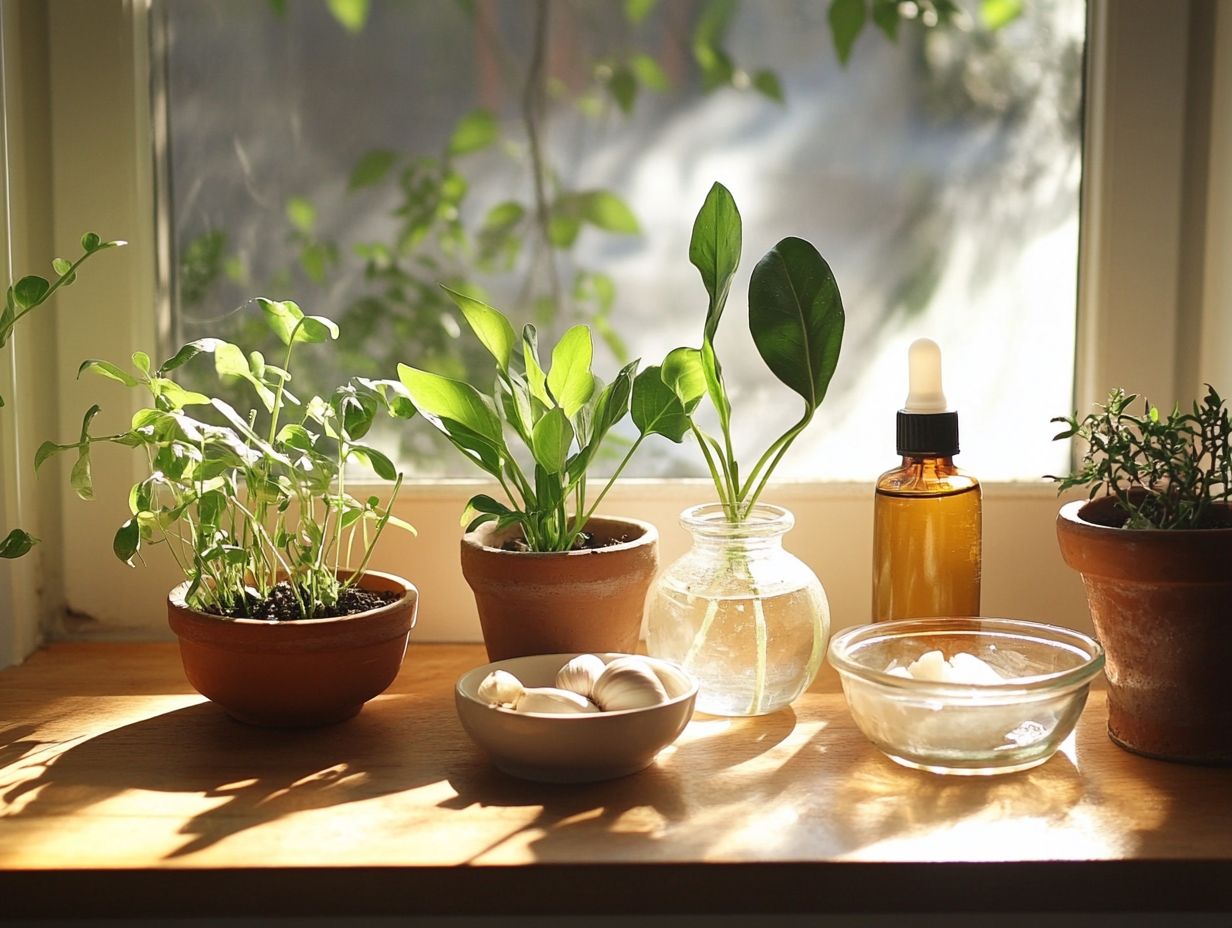
Natural methods for eliminating indoor plant pests include insecticidal soap, neem oil, diatomaceous earth, and introducing beneficial insects like ladybugs.
How does insecticidal soap work to eliminate plant pests?
Insecticidal soap suffocates soft-bodied insects like aphids and spider mites. It disrupts their cell membranes, leading to dehydration and death.
What is neem oil and how can it help with indoor plant pests?
Neem oil is a natural oil derived from the neem tree. It repels and disrupts the life cycles of many pests, including aphids and thrips.
How does diatomaceous earth help eliminate indoor plant pests?
Diatomaceous earth is a fine powder made from fossilized aquatic organisms. It damages the exoskeletons of insects, causing them to dry out and die.
Can using natural methods to eliminate plant pests harm my plants?
Using natural methods to kick pests to the curb is generally safe for your plants! Just make sure you use them correctly.
It’s always a good idea to test a small area first and keep an eye on your plants for any bad reactions.
Are there any natural predators that can help control indoor plant pests?
Yes, there are helpful bugs that can control indoor plant pests. Ladybugs and tiny bugs that eat other pests are great for this.
You can find them online or at garden centers.

